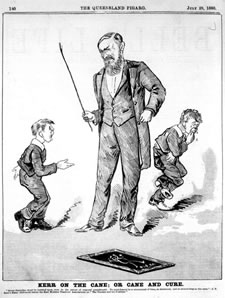 ArchivesACT’s Find of the Month — and Find of the Year — deals with the issue of corporal punishment in Territory schools and its eventual abolition.
ArchivesACT’s Find of the Month — and Find of the Year — deals with the issue of corporal punishment in Territory schools and its eventual abolition.
Archives researchers found that the corporal punishment of unruly or naughty children was once considered a part of growing up and even a significant element of the educational experience.
ArchivesACT said principals and delegated teachers had the authority to give “cuts” or “strokes” of the cane as an accepted disciplinary technique for all manner of student transgressions.
It said despite the issuing and reissuing of instructions to end the practice, principals still had the power to use corporal punishment within Territory Government schools until 1988, at which point its use was banned by the ACT Schools Authority.
ArchivesACT said private schools were still able to use corporal punishment until 1997, when the ACT Government amended both the Education Act 1937 and the Schools Authority Act 1976 to prohibit it by law.
It said debate regarding corporal punishment still made headlines and for this reason records legislating the abolition of corporal punishment in ACT schools in 1997 had been chosen as this year’s Find of the Year.
ArchivesACT said one of the more fascinating records uncovered in its research was the Territory’s earliest punishment book, from the Tuggeranong and Williamsdale School, dated between 1898 and 1939.
“The book made it clear that corporal punishment should only be given for extreme cases of discipline, but our early record indicates that even being caught talking in class was enough to earn one or more cuts of the cane,” ArchivesACT said.
“Far more serious offences, such as stealing, carried anywhere up to six cuts.”
It said one student was recorded in 1905 as receiving four cuts for “destroying the eggs of harmless & useful birds in the school play-ground”.
ArchivesACT said while the non-government school sector continued to allow corporal punishment as part of their disciplinary approach after 1988, ACT Catholic schools banned the practice in 1992.
It said five independent schools chose to retain corporal punishment within their policies after 1988 but, by the 1997 abolition, only two were actually still administering it, in limited circumstances.
ArchivesACT said the Punishment Book of the Public School at Tuggeranong and Williamsdale 1898–1939 will be on display at the ArchivesACT Reading Room for the next month.











